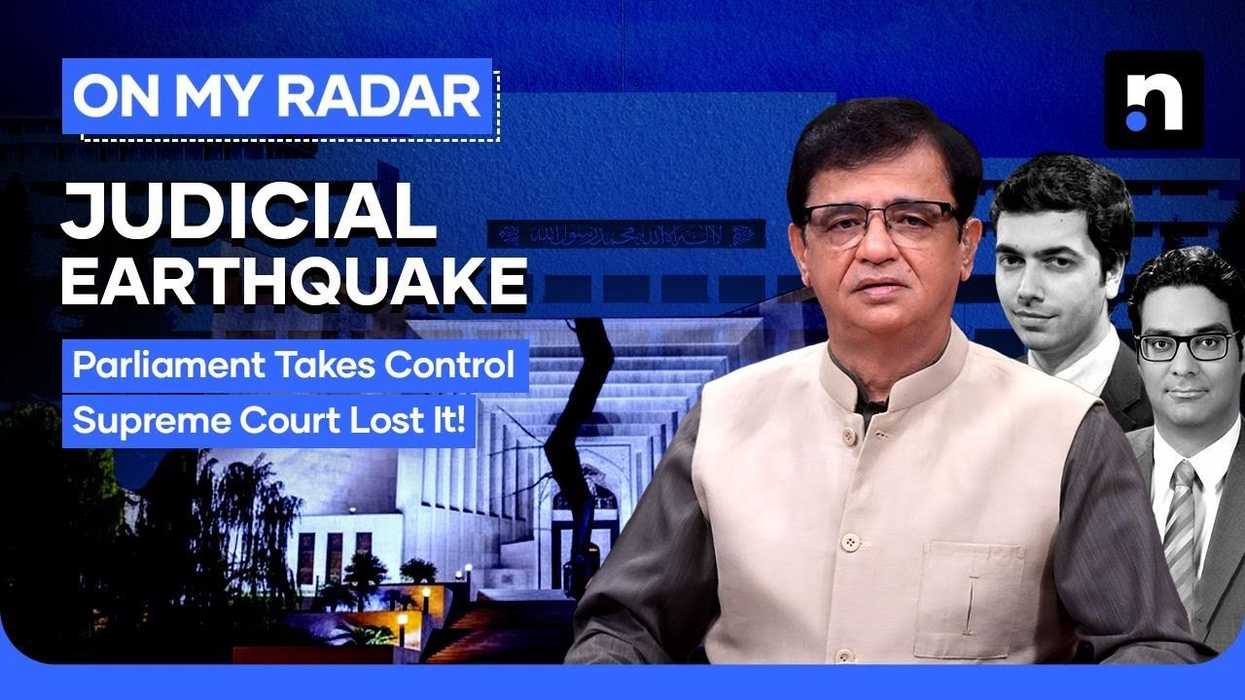Judicial turmoil deepens as Pakistan enforces sweeping constitutional amendments
Kamran Khan says Pakistan’s judiciary is facing a major shock as new amendments reshape the courts and trigger resignations
News Desk
The News Desk provides timely and factual coverage of national and international events, with an emphasis on accuracy and clarity.
Pakistan’s judiciary is facing one of its most significant upheavals in years after the government enforced constitutional amendments that have altered the balance of judicial authority and triggered rare resignations from senior Supreme Court judges.
The 26th and 27th Amendments, passed by parliament with the constitutionally required two-thirds majority, have reshaped the country’s judicial structure. The changes have strengthened the newly established Federal Constitutional Court, or FCC, and shifted key constitutional powers away from the Supreme Court.
The developments were highlighted during an episode of “On My Radar,” where Kamran Khan described the situation as another “earthquake” within Pakistan’s higher judiciary. He noted that while the judiciary has weathered crises before, the current shock is being felt more intensely because the amendments stem directly from changes written into the Constitution.
The timing intensified the drama. Just a day after President Asif Ali Zardari signed the 27th Amendment and the government issued a notification appointing Justice Aminuddin Khan as the first chief justice of the FCC, the two most senior Supreme Court judges after the chief justice resigned in protest.
Justice Mansoor Ali Shah stepped down after calling the 27th Amendment a “blow” to the Supreme Court and an “attack” on the constitution. In his resignation letter, he also quoted a resistance poem by poet Ahmed Faraz.
Justice Athar Minallah also resigned, writing that the amendment had “ended the Constitution” he had sworn to uphold. Remaining silent under such circumstances, he declared, would amount to defying his oath.
The wave of resignations did not end there. Makhdoom Ali Khan, former attorney general and a member of the Law and Justice Commission, also resigned, adding to the perception of a judiciary in turmoil.
Criticism of the judiciary has long been a feature of Pakistan’s political landscape, with allegations of judicial activism, judicial martial law, and decisions that provided legal cover to military governments. Khan noted the country’s long history of internal judicial divisions and reliance on the “doctrine of necessity.”
Despite the controversy, he emphasized that parliament acted within its constitutional authority. Amending the Constitution is its democratic right, he said, and it exercised that right with the required majority.
He also pointed out that while critics argue the new structure places the judiciary closer to the executive, supporters counter that many of the judges who resigned have themselves been accused of ideological leanings. Regardless, he acknowledged that both judges who resigned were widely viewed as honest, professional, and experienced.
Khan then unpacked the specific changes introduced by the amendments. The 26th Amendment, passed last year, revoked the Supreme Court chief justice’s discretionary power to take suo motu notice. It required that cases involving constitutional interpretation be heard only by constitutional benches. It limited courts’ ability to exceed the prayers in petitions and barred challenges to actions taken on the advice of the president, prime minister, or cabinet.
Another key provision allowed the transfer of high court cases to other high courts or the Supreme Court, while promotions of high court judges were tied to reports monitored by a Judicial Commission dominated by executive members.
The 27th Amendment expanded those changes dramatically. It replaced the Supreme Court with the FCC as the country’s highest constitutional authority. At least eight constitutional articles were amended to transfer powers previously held by the Supreme Court to the new court.
Under the amendment, the FCC will now hear presidential references, oversee constitutional matters, and issue binding decisions on all courts—including the Supreme Court. However, FCC decisions are not bound by Supreme Court precedents.
The retirement age for FCC judges was raised from 65 to 68, extending Justice Aminuddin Khan’s tenure by three years. The Supreme Court’s retirement age remains unchanged.
Parliament also shifted the venue for lawmakers’ disqualification cases to the FCC and strengthened the Judicial Commission of Pakistan’s role in judicial appointments and elevations. Under the new structure, a judge who refuses appointment to the FCC will be considered retired.
Three of the six newly appointed FCC judges took oath, but Supreme Court Justice Musarrat Hilali declined the appointment, citing health concerns, according to reports.
Meanwhile, tensions surfaced within the Supreme Court after Justice Salahuddin Panhwar wrote to Chief Justice Yahya Afridi expressing reservations about the 27th Amendment and urging a full court meeting. A full court session was convened today, though reports suggest the discussion focused on amendments to the Supreme Court Rules 2025.
Khan noted what he called a “surprising harmony” between the judiciary and the country’s civil-military leadership. He said both the Supreme Court and FCC appear aligned with the decisions of the state’s security and political establishment.
He contrasted this with earlier eras marked by deep divisions within the top court—from the rifts between justices Saeeduz Zaman Siddiqui and Sajjad Ali Shah to the judicial splits seen under the tenures of justices Iftikhar Chaudhry, Saqib Nisar, Asif Saeed Khosa, Gulzar Ahmed, Umar Ata Bandial, and Qazi Faez Isa.
For now, Khan argued, the lines of division appear to be fading. Whether that stability holds will become clearer as the FCC asserts its new constitutional authority.








Comments
See what people are discussing